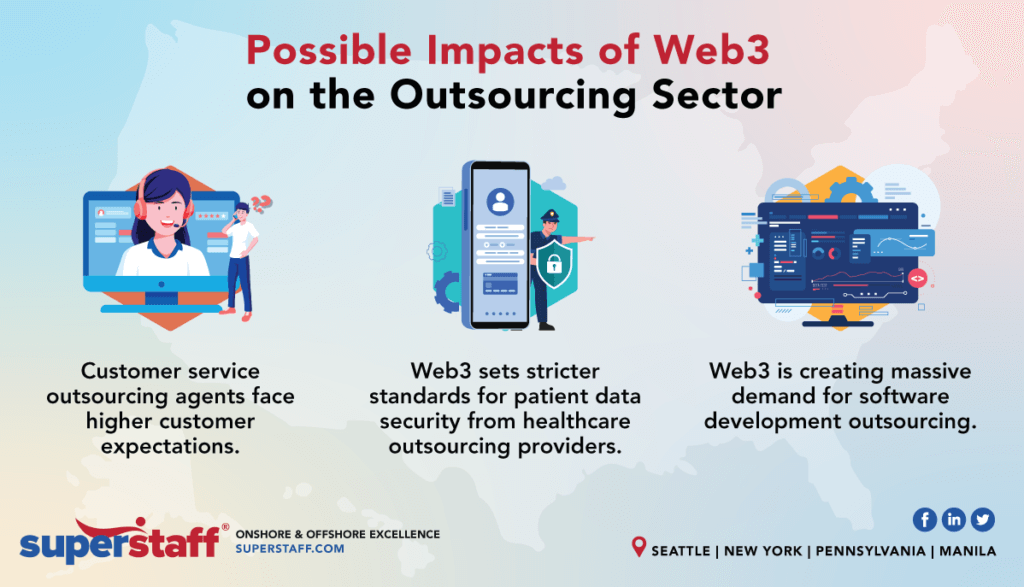
Can you imagine using the internet today without going through Google, Facebook, or other dominant players? With Web3, this scenario might be part of our everyday virtual reality.
What could this possible new internet iteration mean to the outsourcing sector? Let’s explore it in this article.
First, What Is Web3?
Web3 or Web 3.0 is one of the favorite buzzwords of tech companies and venture capitalists today. Proponents eyed it as the next version of Web 2.0, the internet service technology we use today.
To better illustrate Web3, let’s take a trip down to a not-so-distant memory lane. Before the era of vlogs, podcasts, reviews, and other user-generated content became mainstream, traditional media was the primary source of information.
As gatekeepers of information, TV, radio, and newspaper companies hold the responsibility and power to sort and filter content to offer the audiences. Before the emergence of influencers, the media was the authority for news and entertainment.
Today, anyone with a Tiktok, Facebook, or podcast account can be a content creator. Customer reviews about a product or service now have more weight on consumers than conventional advertising.
Web 3.0 will pretty much create the same dynamic. Currently, users interact, search, or publish content online by accessing and providing personal information and digital footprint data to third-party platforms, such as social media and search engine sites.
These platforms, dominated by Big Techs, act as data managers and gatekeepers of user information. Web3 eliminates the need for internet users to go through external platforms to interact, search, or do anything online.
As a result, data becomes decentralized, and users become individual owners and managers of their information. They can access, control, and monetize their data directly through public cloud technology. This freedom means that the users have hands in the general safekeeping of their data.
To be clear, Web3 is still at its conceptualization stage. But, it is stirring discussions—and excitement—in Silicon Valley and beyond. Critics believe it would wreak havoc on the physical and digital world in 5 to 10 years.
What Are the Possible Impacts of Web3 on the Outsourcing Sector?
On Customer Service Outsourcing
Customer trust and loyalty go hand in hand. Research shows that 48% or nearly half of consumers would be willing to exchange personal information for a more personalized experience—as long as their data is secure. Web 2.0 functions this way at present. Consumers practically trade their data to use a service or an app.
Web 3.0 can meet the consumers’ need for personalization and security. Among the significant selling points of Web 3 is giving users the ability to manage and secure their personal information through blockchain technology. Consumers can have a better sense of security as they remain in control of their data. Such a more transparent environment increases the brand’s ability to enhance customer engagement and gain loyalty.
Aside from innovating customer loyalty, Web3 can also offer consumers a more immersive experience. Even today, consumers crave and expect hyper-personalization whenever they interact with brands. This expectation will likely increase once Web3 is here. Take a look at the following statistics collated by Forbes:
- 80% of customers are more likely to buy from brands that offer personalized experiences (Epsilon)
- 70% of consumers find it essential that brands have a context of how they use the product and services (Salesforce)
- 72% of customers would only engage with brands with personalized messaging (SmarterHQ)
With Web 3.0, customers will no longer be at the receiving end of the experience. Instead, they will be co-creators of their journey. By giving the consumers autonomy over their experience, Web3 can exceed customers’ expectations for a personalized experience.
Outsourcing providers will have to cope with the new kind of dynamics that Web3 will create. While it is unlikely that live customer support services will become obsolete, self-service solutions will likely be the go-to approach of consumers. Customer service outsourcing agents will have to face higher customer expectations.
Since consumers can pretty much do everything independently, they will expect agents to keep pace with their speed. They will also likely reach out to live agents for more complex issues, so empathy and other soft skills will have to be elevated.
Read More: 6 Ways Offshore Customer Service Outsourcing Provider Boosts E-commerce Customer Lifetime Value
On Healthcare Outsourcing
The decentralization of patient data will significantly benefit healthcare professionals and patients. Having the correct data at the right time is crucial to life-saving or life-threatening situations. But the health sector’s segmented data collection and management practices make accessing existing patient records time-consuming and even impossible at times.
Web 3.0 can help practitioners elevate patient care by making real-world data visible to healthcare professionals across various disciplines. As a result, practitioners will have an easier time delivering personalized, end-to-end, and collaborative patient care. Web 3 can give healthcare professionals a 360-degree view of the patients’ state by allowing access to their:
- Existing health records
- Fitness activities recorded by health or fitness apps
- Previous interactions with other healthcare providers or systems
- Purchase history that gives insights about their diet, nutrition, medication, and lifestyle
However, Web3 also raises crucial questions about securing patient information. Who will protect the data against hacking and other potential security threats? While this issue applies to all other sectors, it is far more critical in healthcare, given the sensitive nature of patient data involved.
At present, the HIPAA privacy rule puts the responsibility in the hands of healthcare providers and organizations. But with Web3 making data available to the public, the likelihood that the standards and guidelines will evolve is high. This challenge is perhaps the biggest that practitioners and healthcare outsourcing providers will have to navigate once Web3 becomes available.

On Software Development Outsourcing
Despite the hype surrounding Web3, the population of web developers currently exploring it is relatively small. About 18,000 active developers were working on the iteration as of 2020. However, its growing clip reflects that the increasing interest in Web 3.0 is creating a demand for developers. Since 2021, there has been a 67% rise in the need for Web3 skilled candidates.
Even though Web3.0 hasn’t taken off yet, nearly 90% of the operations of average-sized companies today are equipped or supported by software or technology—that requires constant updates and changes in codes. The rapid digital adoption of companies worldwide results in a shortage of software development talents. Take a look at the following data:
- By the end of 2021, unfilled IT jobs rose to 918,000.
- The U.S. Bureau of Labor and Statistics predicts that software development jobs will have a 22% growth rate between 2020 and 2030.
- There was a 43% decline in enrollment since the pandemic, reducing the number of computer and information science post-graduates by 11,700 in 2021.
To help fill the gap, many brands today turn to the outsourcing sector to access a global pool of software development talents. Outsourcing will play a crucial role in helping brands thrive in the possibly new internet ecosystem.
Read More: Your Guide to Technology in Outsourcing: 5 Tech-Driven Trends Redefining the BPO Industry in 2022
On E-Commerce Outsourcing
Internet shopping as we know it could also transform as soon as Web3 comes into fruition. Consumers will no longer have to move from one site or app to another to complete a transaction or accomplish anything online.
Web 3.0 will permit an ultra-personalized shopping experience with an intelligent bot that can search through the cloud and offer recommendations based on all the customer’s information—from physical features and demographics to behaviors and beliefs. In short, it can anticipate one’s needs based on one’s available data.
For small businesses, acquiring such ability would be a significant challenge. Developing intelligent technology in itself is costly. But the expenses don’t end after having the tool. Brands will also have to deal with maintenance, upgrade, and other implementation costs to ensure a consistent and seamless user experience.
Given this, we can expect a rise in brands tapping the services of e-commerce outsourcing providers to gain access to advanced technological infrastructure while saving on costs.
On Recruitment Outsourcing
Candidate screening is among the most time-consuming recruitment processes. Even with artificial intelligence, recruiters spend a tremendous amount of time conducting thorough qualification checks and background screenings, which can be challenging in a centralized data system.
Web 3.0 can enable recruiters to get to know candidates and assess their capabilities better. By accessing a decentralized ledger, they can gain rich and in-depth insights into the candidates’ personal information and activities online.
Web3 can also help elevate candidates’ experience by minimizing the need to spend time filling out numerous forms. Potential employers can just view job seekers’ digital identities from the public cloud database.
SuperStaff Is Ready To Take On the Challenges of Change
We’ve seen how the emergence of wide-scale disruptions rapidly transforms consumer expectations to a whole new level. Ready or not, virtually all industries were forced to adapt. While Web3 remains in the distant future, we can expect that it will bring new, significant, and unique sets of challenges to all sectors once it reaches the mainstream market.
As Web3 transforms the internet into a self-governing, free-for-all platform, business and individual users will face new forms of cybersecurity threats. The demand for global talents with specialized skills will also rise exponentially.
Furthermore, Web 3.0 will pave the way for a more globalized marketplace and require brands to have a presence across different borders. Amid all these potential challenges, businesses can expect the outsourcing sector to adapt just like it did in the past.
SuperStaff has always been an early adopter of solutions that enable our clients to remain competitive. Count on us to stay at the forefront of technological advancements and pivot, innovate, and adapt to continuously deliver the support you need to evolve with the fast-changing market.






